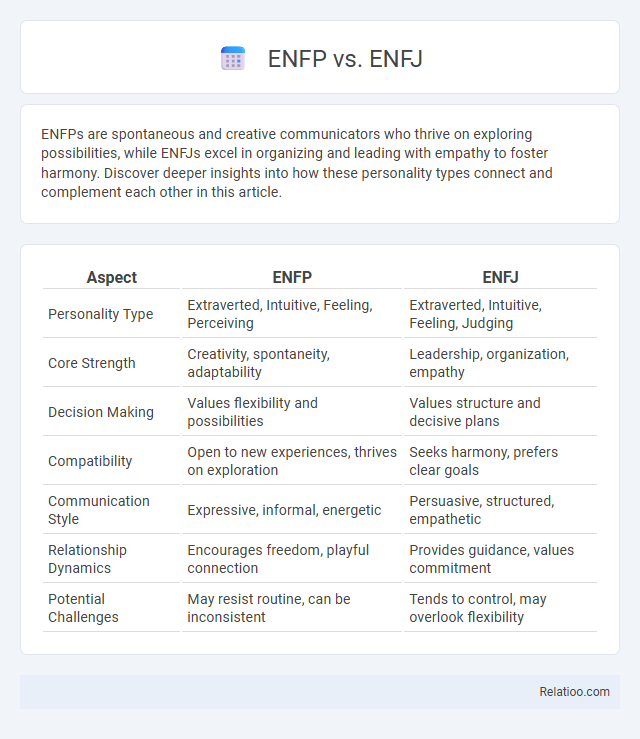ENFPs are spontaneous and creative communicators who thrive on exploring possibilities, while ENFJs excel in organizing and leading with empathy to foster harmony. Discover deeper insights into how these personality types connect and complement each other in this article.
Table of Comparison
| Aspect | ENFP | ENFJ |
|---|---|---|
| Personality Type | Extraverted, Intuitive, Feeling, Perceiving | Extraverted, Intuitive, Feeling, Judging |
| Core Strength | Creativity, spontaneity, adaptability | Leadership, organization, empathy |
| Decision Making | Values flexibility and possibilities | Values structure and decisive plans |
| Compatibility | Open to new experiences, thrives on exploration | Seeks harmony, prefers clear goals |
| Communication Style | Expressive, informal, energetic | Persuasive, structured, empathetic |
| Relationship Dynamics | Encourages freedom, playful connection | Provides guidance, values commitment |
| Potential Challenges | May resist routine, can be inconsistent | Tends to control, may overlook flexibility |
ENFP vs ENFJ: Core Personality Differences
ENFPs exhibit spontaneous creativity and prioritize individual freedom, often thriving on exploring new ideas and possibilities, while ENFJs focus on structure, organization, and fostering harmony within groups, demonstrating a natural leadership drive. Both types share a strong emphasis on empathy and interpersonal connection, but ENFPs prefer a flexible, open-ended approach compared to ENFJs' strategic, goal-oriented manner. Understanding these core personality differences helps clarify how ENFPs pursue authenticity and novelty, whereas ENFJs emphasize responsibility and community impact.
Key Strengths of ENFPs and ENFJs
ENFPs excel in creativity, enthusiasm, and adaptability, often thriving in dynamic environments where they can explore new ideas and connect with diverse people. ENFJs possess strong leadership, empathy, and organizational skills, making them effective at inspiring others and managing group dynamics. Your shared interest in understanding and motivating others highlights your complementary strengths in emotional intelligence and interpersonal communication.
Communication Styles: ENFP vs ENFJ
ENFPs exhibit spontaneous, enthusiastic communication marked by creativity and emotional expressiveness, while ENFJs favor organized, empathetic dialogue aimed at fostering harmony and understanding. Both types share a genuine interest in connecting deeply with others and value meaningful conversations that build trust and collaboration. Your communication style benefits from recognizing the ENFP's passion for idea exploration and the ENFJ's focus on structured emotional support.
Decision Making Approaches
ENFPs rely on spontaneous, values-driven decision making, prioritizing personal authenticity and exploring multiple possibilities. ENFJs prefer structured, people-focused decisions guided by empathy and a strong desire to achieve harmony within groups. Both types share a focus on understanding others' emotions and motivations but differ as ENFPs embrace flexibility while ENFJs emphasize organized planning.
Social and Relationship Dynamics
ENFPs thrive on spontaneous social interactions and value individuality, often seeking deep emotional connections through open-ended exploration. ENFJs prioritize structured social harmony and demonstrate a natural ability to nurture relationships, often taking on leadership roles in group settings. Both types share a passion for meaningful relationships and empathetic communication, making collaboration and mutual understanding key components of their social dynamics.
Career Preferences: ENFPs vs ENFJs
ENFPs thrive in dynamic, creative careers that offer personal autonomy and opportunities for innovation, such as marketing, writing, or entrepreneurship. ENFJs excel in leadership roles that require empathy and organization, including counseling, teaching, or management positions. Your shared interest in people-oriented fields highlights a mutual preference for careers centered around collaboration and meaningful impact.
Conflict Resolution Strategies
ENFPs approach conflict resolution with creative problem-solving and a focus on personal values, often seeking imaginative solutions that honor individual freedom. ENFJs prioritize harmony and empathy, using their strong interpersonal skills to mediate and address the emotional needs of all parties involved. Shared interests between ENFPs and ENFJs include valuing open communication and fostering cooperation through understanding different perspectives.
Growth Areas and Common Challenges
ENFPs often focus on personal freedom and creative exploration, while ENFJs prioritize structured leadership and harmony, both striving for growth in emotional intelligence and decision-making clarity. Shared interests in social connections and helping others drive their development, yet common challenges include balancing idealism with practical responsibilities and managing emotional intensity. Your growth lies in embracing self-discipline and empathy to navigate these complexities effectively.
Famous ENFPs and ENFJs
ENFPs and ENFJs share a strong passion for people and creativity, with ENFPs often valuing spontaneity and innovation while ENFJs prioritize organization and leadership in social settings. Famous ENFPs like Robin Williams and Ellen DeGeneres exemplify energetic, imaginative personalities who thrive in dynamic environments, whereas notable ENFJs such as Barack Obama and Oprah Winfrey demonstrate influential, goal-oriented leadership and empathy-driven communication. Both types excel in connecting with others but differ in their approach to structure and decision-making, making their shared interests in people-centered careers a rich area for collaboration.
Choosing Between ENFP and ENFJ Paths
ENFPs thrive on creative exploration and value autonomy, while ENFJs excel in leadership roles focused on harmony and consensus. Both types share a strong passion for personal growth, meaningful relationships, and community impact. Choosing between ENFP and ENFJ paths depends on whether you prioritize innovative independence or collaborative leadership in your career and lifestyle.

Infographic: ENFP vs ENFJ
 relatioo.com
relatioo.com